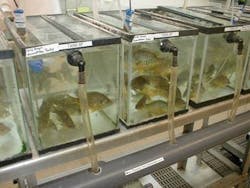Endocrine Disrupting Chemical Study Completed
Three university researchers and a Metropolitan Water Reclamation District of Greater Chicago (MWRD) scientist have chronicled the presence and biological effects of Endocrine Disrupting Chemicals (EDCs) in Chicago area waterways to determine the impact of these unregulated chemicals on urban waterways. Their findings concluded that EDCs are found throughout the waterways but exposure to the waterways showed no immediate harm to fish populations.
EDCs are found in many household and industrial products such as pharmaceuticals and personal care products. Because there is uncertainty on the overall impact of these unregulated chemicals on urban waterways, Thomas Minarik, MWRD senior aquatic biologist, and others began studying the presence and biological effects of these chemicals throughout the waterways. Joining Minarik were Dr. Heiko Schoenfuss, St. Cloud State University, St. Cloud, Minn.; Dr. Dalma Martinovic-Weigelt, University of St. Thomas, Minneapolis, Minn.; and Dr. Melissa Schultz, College of Wooster, Wooster, Ohio.
The team collected and archived more than 1,000 water samples from 45 locations on the waterways from January 2009 through July 2012. Approximately 3,000 fish were analyzed and a mobile laboratory trailer was used to investigate sources of EDCs.
The group discovered that EDCs, including estrogens and personal care products, are common in the waterways, which is a finding that is consistent with other studies both nationally and globally. These compounds originate from runoff from streets after snowmelt and heavy rains, treated wastewater and other sources. Water reclamation plants are not designed to completely remove these chemicals.
Many EDCs can be controlled by properly disposing pharmaceuticals and pet waste, using biodegradable cleaning supplies and discontinuing the use of soaps that contain antibacterial agents.
“Most endocrine active compounds begin their journey into the aquatic environment in our own households and with our own actions. Every one of us can contribute to a reduction of these compounds in the wastewater stream by being more aware of the products used and their appropriate means of disposal,” said Schoenfuss.
Findings from this study will be published in the journal Environment International, and the Journal of the American Water Resources Association in three separate papers. Additionally, the research team was recently awarded a National Science Foundation grant to continue their research in Chicago area waterways as the MWRD works to upgrade two of its water reclamation plants to disinfection, which may lower the concentrations of endocrine disrupting chemicals in their effluents.
Source: MWRD


